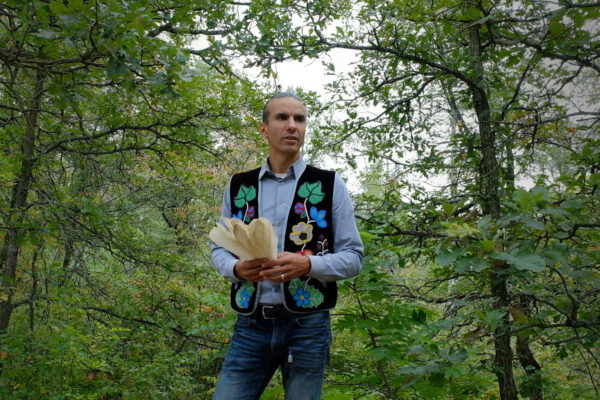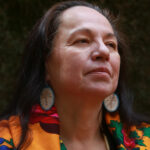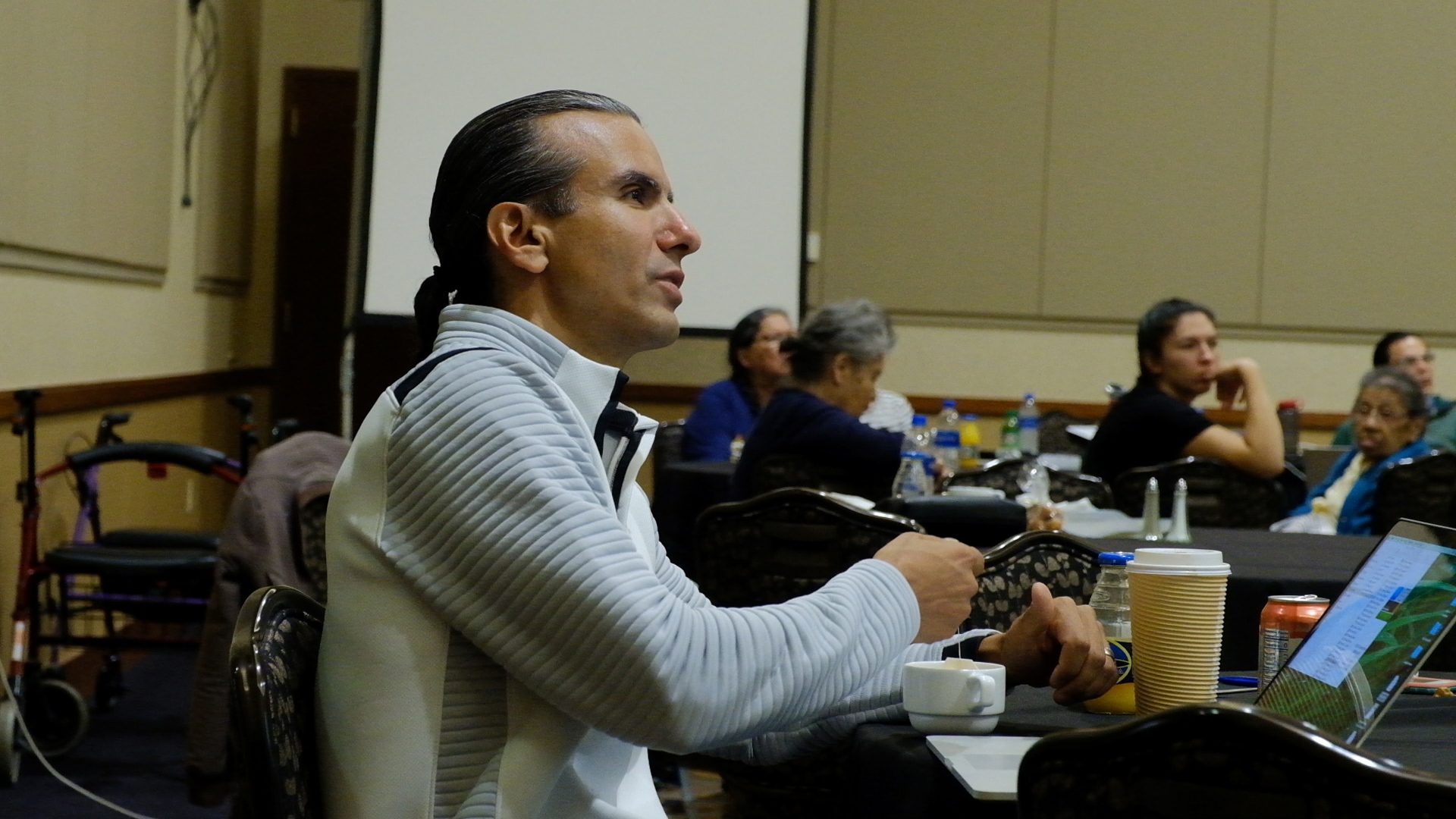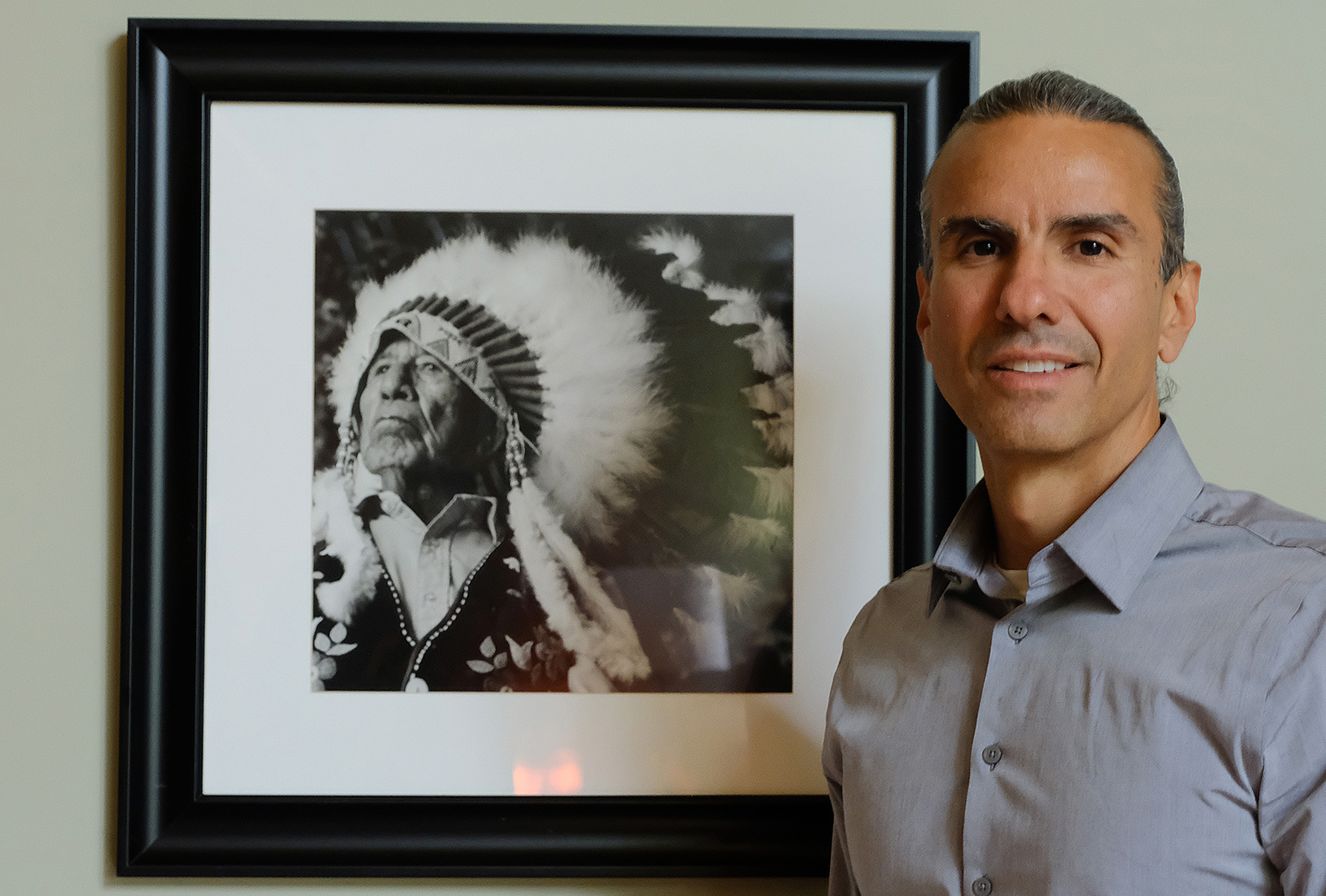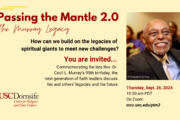This article was originally published in Al Jazeera, with the support of CRCC’s global project on engaged spirituality.
Anton Treuer grew up in the Deep North.
Just as the Deep South is associated with racial antipathy, so too is the great regional swath of land spanning Northern Michigan, Wisconsin and Minnesota for native Americans.
Treuer is a descendant of the Leech Lake Band of Ojibwe tribe, whose lands border the small city of Bemidji, Minnesota, in the heart of the Deep North.
Surrounded by three Ojibwe reservations – Leech Lake, Red Lake and White Earth – Bemidji is a border town (predominantly white and known for racial hostility towards native people) if ever there was one.
“When I went to Bemidji public schools in the 1980s, there were no native teachers, no native police officers, no native people in charge,” he recalls from a vacant classroom overlooking a manicured campus in the American Indian Resource Center at Bemidji State University.
The 50 year old is now in his 20th year as a professor of Ojibwe language at the university, but he is still among just a handful of indigenous language professors teaching in US universities.
The resource centre is the hub of native life for students and the community. It houses collections of the intricate floral beadwork for which Ojibwe are known and large black and white portraits of notable Ojibwe leaders hang in the great room, which functions as a classroom as well as a community space for ceremonies and meetings.
It is a showpiece for both the city and the university; a celebration of native peoples. But things were not always this way in Bemidji.
A bucket of whiteness
Anton Treuer is now Dr Treuer. Dressed in a crisp shirt and with his long hair, flecked with grey, pulled back into a sleek bun, he looks every bit the professor.
He is a native man in leadership, living proof that native people can flourish in spaces previously dominated by white people.
But when he was growing up here, native people were viewed as second-class citizens, incapable of navigating the white man’s world.
He resented a public education system that largely ignored the existence and capabilities of native Americans.
“I struggled through school, being spoon-fed out of a bucket of whiteness every day,” he reflects.
“I found ambition, pursued a formal education after high school and beyond but I knew I was just buying time and building credentials. I was subversive, contrarian, driven, and ready to do something big and bold. I wanted to turn the whole education system of torture on its head. I just needed to find a way.”
After graduating from Princeton University, Treuer earned his doctorate in history at the University of Minnesota.
He has written several books about language, culture and history including: Living Our Language: Ojibwe Tales and Oral Histories, Everything You Wanted to Know about Indians but Were Afraid to Ask, The Assassination of Hole in the Day and Oshkaabewis Native Journal.
In his latest book, The Language Warrior’s Manifesto; How to Keep Our Languages Alive No Matter the Odds, due out in February, he writes about navigating the dispiriting education system of his youth.
‘You f****** Indian’
But Treuer’s path to professional and personal success has been studded with challenges.
A high achiever, he was the sole native student selected to join a high school camping trip to Canada. His white tent mate, outweighing him by 100 pounds publicly abused him, striking him in the face while screaming, “You f****** Indian!”
“I spent the whole trip in fear, afraid I’d kill him in anger or afraid I’d be killed if I didn’t finish the job,” Treuer recalls.
The white counsellors failed to intervene, dismissing the abuse as “boys being boys”.
Isolated in the woods with no responsible adults to turn to for help, he realised his life was in danger. “I envisioned my parents receiving a letter about an unfortunate accident in which I’d been killed,” he says.
Treuer vowed that after high school, he would leave behind the hurt and anger of his childhood home and pursue an academic career.
But despite his good grades and test scores, his white high school counsellors steered him away from college and towards vocational training.
On his own, he applied to and was accepted by Princeton University. “I put up my acceptance letter on the wall outside the counsellor’s office,” he says.
“My only thought was escape; I thought I’d never return.”
Language as a tool for healing
He focused on creating a life as a politician or lawyer.
But he soon found out that colonial ways of thinking reached far beyond Bemidji; there was no escape from them.
“I’d be around educated people and they were just the dumbest smart people I ever met. The racist stuff started all over again. And then I just wanted to get home,” he recalls.
“I felt like there was nowhere that it was OK for me to be me. There was always some sort of racial tension.”
Advocating for indigenous language revitalisation, however, has offered him healing and empowerment.
“Language can disrupt the glue for colonial thinking which has been fundamentally dehumanising to indigenous people,” he explains.
“Although we can’t stop the bludgeon of forced assimilation, we can decolonise and re-indigenise everything we do, recognising that in our worldview, spiritual, physical and mental health are intertwined. This is where real healing will come from; the language is a powerful tool in this work.”
The Grand Medicine Lodge
Treuer’s long search for spiritual and professional fulfillment landed him back where he had started – in Bemidji.
He is now well-known in the community for his racial and social equity work – and it is having an impact. Townspeople are making efforts to shake off their border town reputation and local store owners recently installed bi-lingual Ojibwe and English signage.
Treuer has also quietly assumed a leadership role in the Grand Medicine Lodge, an Ojibwe spiritual society that predates European contact in the Americas.
Although it is a secret society in which prayers, songs and rituals are carefully guarded from outsiders, Treuer agreed to speak about it in a general way, particularly its importance in preserving the Ojibwe language and worldview and in providing healing for the community.
He also shared his personal journey to this unlikely leadership role, which he says he ducked and dodged for as long as he could.
“I knew I’d be a slave to the people,” he explains.
The ceremony
Indeed, he is a popular figure in the community. Ojibwe people in search of healing, guidance or help with laying a loved one to rest seek him out, pressing asemaa (tobacco) into his hand. The gift of asemaa, an important medicine for Ojibwe, establishes a bond and spiritual commitment far more valuable than money. Asemaa is his only payment for spiritual services.
In addition to his professional duties at the university, his role as father to nine children and husband to wife Blair, he presides at the often-gruelling lodge ceremonies, which can last for 10 days or longer depending on the number of participants. He and a crew of Oshkaabewis, or helpers, are also called upon to conduct funerals year-round throughout Ojibwe country.
Once it has begun, the ceremony becomes a living thing; the process must continue regardless of weather or other circumstances.
“Fortunately, my work at the university makes for a schedule favourable to our lodge,” he says. The lodge meets twice a year during the summer.
Looking back, Treuer says he had no ambitions to be a spiritual leader.
“I didn’t want to be the leader of anything; even now as leader, my goal is to be replaceable many times over. My hope is that the ceremony can live and thrive and be available to Ojibwe people for generations past the time when my name is forgotten. That’s why we have so many Oshkaabewis in the lodge; if something were to happen to me today, I’m confident that the ceremony would continue.”
Treuer was drawn to the lodge by his love of the Ojibwe language as well as the sense of community there. At the lodge he found a group of people who had shared similar experiences and had empathy for his struggles as a young native man.
‘I’ve been waiting for you’
After graduating from Princeton, Treuer had returned to Ojibwe country to “walk the earth,” in search of his life’s path.
As part of the walk, he met Archie Mosay, an elder who was leader of the lodge but has since passed away. Mosay was the descendent of generations of lodge leaders.
Treuer recalls walking into Mosay’s tiny reservation house, which had no electricity or running water. The elder was laughing when he arrived, watching a World Wrestling Federation (WWF) Smackdown on a generator-run television.
“Archie shut off the TV and looked at me. He said, “I’ve been waiting for you.” Which was strange because we’d never met before,” Treuer recalls. “He said I was a person he saw in a dream, a person he should open up to.”
“I spent several years helping Archie, driving him to ceremony and helping in the lodge.”
It was during these years that he learned the complex prayers, songs and rituals that comprise lodge ceremonies. Since nothing associated with the lodge is ever written down or recorded, Treuer and the Oshkaabewis rely on memory.
He credits Mosay’s intense mentorship and other supportive Ojibwe speakers with helping him memorise the elaborate process.
“I was just hungry for a deeper relationship with the language,” he says, adding: “I also relied on the desire and direction of the spirits.”
Spirituality embedded in language
Treuer believes every language embodies a unique worldview. Thoughts and concepts that are unique to Ojibwe people are embedded in the language.
“In English we say we should respect our elders but in Ojibwe, the word for elder is gichi-aya’aa or great being; the word for elder woman is mindimooye or one who holds us together,” he explains.
“Ojibwe words are already so loaded with respect that we don’t view respect as a separate concept. In that same vein, spirituality is embedded in the language. There’s no conceptual way to separate our physical and spiritual forms from each other.”
According to the Ojibwe worldview, people are not human beings looking for a spiritual experience; they are spiritual beings having a temporary human experience.
“There’s a oneness we have with each other and creation that is expressed in the language,” he reflects.
The lodge ceremonies are, therefore, conducted entirely in Ojibwe.
“Changing the ceremony and doing it in English would lose a lot of the nuanced meaning and some of the spiritual force. I really believe that the language is a powerful tool to keep us recognisable to our ancestors,” he explains.
The repetitive prayers and songs for each person speak to the reasons they are coming through the ceremony, providing directed energy to help heal and connect them. The songs and prayers emerge from the soul; Ojibwe consider the bodies as temporary housing for the soul.
“The songs travel from one soul to another. If we recorded those songs, we might capture the intellectual dimensions but they would be stripped of spiritual power and energy,” Treuer says.
“The songs and prayers have been presented orally in a sequence over hundreds and hundreds of years. To circumvent that process would lose the spiritual dimension.”
The beginning
Although there is no recorded date, according to Ojibwe oral history, the Grand Medicine Lodge began long before the arrival of Christopher Columbus.
Despite pressure from early Christian missionaries to burn their sacred lodge items, many people continued following the religion in secret.
“This particular ceremony was probably practised in almost all Ojibwe communities at one time. Right now there’s half a dozen active lodges. But in whole regions of Ojibwe country, people do not participate in the ceremony and don’t have access to it,” Treuer explains.
Now, Ojibwe are reclaiming this birthright; they come for relief from physical ailments, sexual and physical abuse, neglect, abandonment, addiction, conditions often brought on by the traumatising fallout from colonisation.
The ceremony begins slowly. There is a great deal of active waiting as participants are grounded to the physical place.
Treuer describes it as a gradual trickling process, building slowly into a greater and greater charge of energy.
The ceremony includes physical movement and work; initiates offer gifts and participate in building a wigwam out of pre-European contact materials. Each forward step for the initiate represents dropping off sickness, a bit at a time.
“As part of the initiation rite, people receive songs and teachings. They go through a complicated procedure and they essentially go through a ritual death and rebirth; they’re reborn a new person, healthier and full of teachings to help guide them through life. My function, along with others called Oshkaabewis or helpers, is to help officiate that process,” Treuer says.
“In the non-Native medical world, people are encouraged to leave their emotions at the door, leaving them shut down and discouraged. But this is a place where people can bring their emotions, where others will help share the load.”
‘Models for the world’
Officiating at the lodge is hard, demanding work but Treuer describes it as rejuvenating.
“Yes, I get tired but I am getting a huge charge of energy as part of the process.”
He walks through the lodge grounds with a vigorous athletic stride, appearing as fresh and eager on the last day as he is on the first.
Although he has been leading the lodge since 1996, he continues to see new meaning and texture in the intricate ritual.
“It’s stunning how this lodge can continue to unveil new meaning and connections,” he notes.
The substance of the lodge ceremonies are secretive; details are only divulged to Ojibwe people as part of their initiation. Participants must be physically present and engaged for the duration of the ceremony.
“Rather than watching the ceremony on YouTube or learning songs online, people have to engage with elders and the lodge on its terms as determined by our ancestors,” Treuer explains.
He is a strong advocate for using books and modern technology to further Ojibwe language preservation and revitalisation, but believes learning the language in a spiritual context connects people in an authentic, soft-tissue way.
Sometimes Treuer and the Oshkaabewis are pressured to allow non-native, non-Ojibwe people to participate in the lodge.
But they believe the lodge must be preserved for Ojibwe.
“In rituals not of our making, we are cautioned not to change them,” Treuer says.
He and others worry that non-natives would likely co-opt, institutionalise, commodify and change the ceremony if they were allowed access, pushing Ojibwe out.
“Our people might lose faith in the lodge and no longer be able to access its benefits.”
By maintaining the integrity of the lodge, Treuer and the Oshkaabewis ensure that modern Ojibwe are still recognisable to their ancestors.
“I often marvel at the fact we have been making offerings, repeating teachings and songs in the same place for generations,” he reflects.
Although Treuer empathises with the desire of non-natives to participate, he encourages people to seek out their own elders and learn about their origins rather than co-opting them from someone else.
“Non-native people are drawn to our ways because their ways of connecting to creation have been largely obliterated and institutionalised by organised religions; although they may have vestigial remnants of earth-based traditions, their worldview has been so colonised that it’s difficult for them to overcome. The institutionalisation of spiritual knowledge and access fundamentally objectifies spirituality,” he says.
Culture and spirituality, embedded in the language, is one of the remaining ways Ojibwe, from whom so much has been taken, have to heal and survive.
“Rather than serving as mainstream society’s gurus and giving away our ceremonies,” Treuer says “indigenous people can serve as models for the world in how to connect with creation in a healthy way.”
Click here to read the story on aljazeera.com.
Mary Annette Pember is a journalist fellow with the Spiritual Exemplars Project.
